NASJE member Dr. Jan Bouch recently completed her certification as a Conversational Intelligence Coach. Her capstone project, C-IQ Transformational Competencies Mapped to ICF Core Competencies, was selected for presentation at the August 2019 graduation. Dr. Bouch, a Professional Certified Coach (PCC) and owner of the Justice Coaching Center, is also certified to use Checkpoint 360, an instrument that assesses 70 core competencies and is used as a tool for development of others.
Category: NASJE Member Kudos
-
NASJE Secretariat Honored for Service
Nikiesha Cosby, an association manager with the National Center for State Courts and the secretariat for NASJE, recently received the Florence McConnell Award from the National Center.
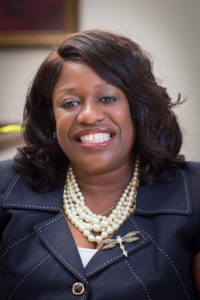
Nikiesha Cosby The award honors former employee Florence McConnell and goes to the employee whose interaction with the courts and with fellow employees creates an atmosphere of trust and respect. The recipient not only maintains a high level of professional performance but also is supportive of colleagues in their personal challenges.
Cosby began working for the National Center in 2006 as an administrative specialist and was promoted to program specialist before becoming an association manager in 2016.
NASJE President Tony Simones said Cosby is most deserving of the recognition.
“Most NASJE members only see Nikiesha at our annual conference, where she is instrumental in ensuring our success. What they don’t know is that Nikiesha works behind the scenes throughout the year, engaging in problem-solving, providing essential guidance and fielding calls from the President of NASJE on a disconcertingly broad array of issues,” said Simones. “She performs these miracles without ever losing her good humor and wonderful outlook on life. We are blessed to work with her and to know her.”
-
Fort Worth Court Director Receives National Award
by Mark Goodner, Deputy Counsel and Director of Judicial Education, TMCEC
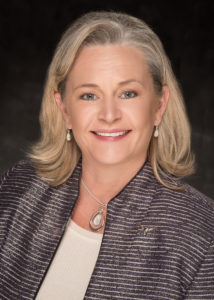
Theresa Ewing Theresa Ewing is the Director of Municipal Court Services for the Fort Worth Municipal Court. Earlier this year, the National Center for State Courts selected Ms. Ewing to receive its 2018 Distinguished Service Award. This award is presented annually to honor those who have made substantial contributions to the field of court administration and to the work of the National Center for State Courts. I was able to sit down with Ms. Ewing recently and ask her questions about the award as well as her work in Fort Worth.
The National Center for State Courts selected you to be the recipient of the 2018 National Center for State courts Distinguished Service Award presented to honor those who have made substantial contributions to the field of court administration and to the work of the national center. How does it feel to have your name next to those words?
Humbling… Terrifying… It’s beyond comprehension really because as I look back on the people who have received this award in the past, they’re all of the people that I look to as my mentors and my heroes of court administration over the years and to be recognized among the legends is just humbling.You’ve worked in courts for 28 plus years but you came to Texas in 2016. Is there anything that struck you as different about the way that Texas courts work?
I think one of the biggest distinctions between Texas courts in the municipalities is that this is the first time that I’ve ever worked in the executive branch of government as opposed to the judicial branch of government, and so the relationship factor is so much more important. It really is a mutual relationship on how you run the courts as opposed to the judges [in other states’ systems] dictate how the courts are run and your [the court administrator’s] job is to execute those things. You really do have to have a really symbiotic relationship with your presiding judge in order to make the court function. Before, I’ve always worked in an institution where your chief judge gives the directive and you’re required to execute that. It’s a very different dynamic knowing that there’s not a direct report, but there must be a relationship in order to make the court work most effectively.What are you most proud of about your work with the Fort Worth court?
There are so many things I’m proud of. My most proud moment is, of course, we instituted warrant forgiveness month which was a success beyond what any of us could’ve ever imagined. I think one of the other big undertakings is our cross-training and our actual certification of staff in the TMCEC certification levels because that had not been anything that had been previously pursued. We had staff working in silos and bubbles, and didn’t understand the impact of their jobs versus what happened next in the process. So really pushing to get that education piece done and developing leaders in the future courts—that is really what we should all be doing.What do you think is the biggest challenge to court administrators you’re so close (either current or coming challenge) that they have to deal with in Texas municipal courts.
I think it’s not just Texas municipal courts, but nationally, is really engaging the public in relevancy. Why are courts relevant in this day and age when there are so many different alternative methods of dealing with disputes? We talk about ADR. We talk about putting pretrial services in place. We’re trying to put different modalities in place, but trying to get people to remember the courts are the neutral party you can go to. Just because you’ve been accused of a crime doesn’t mean that that’s definitive. People forget that’s why we have we have courts. We have courts because they need to have a place they can come to a neutral arbitrator that can say, “State, you did your thing, now I want to hear the other side of the story. Did you do your thing right? Let’s put it together and let’s make a final decision.” That’s why courts exist. And we are forgetting that that’s why we exist even at the municipal court level where we see thousands upon thousands of people that have an opportunity to come to a neutral arbitrator. So education and relevancy, for us, has been a big push because if people don’t understand that that’s the role of the court, that’s where you get fear. That’s where you get noncompliance because they’re afraid to come in and talk to us.For municipal courts week, we had three different sets of groups come in and do mock trials with us. We had young men and women in high school and junior high walking through metal detectors scared to death about the fact they were coming into a court and they could not believe that we were “nice.” Judge Rodgers and I had an opportunity to talk to all of the groups and say this is what we do with and this is why we exist and have a conversation about judicial versus nonjudicial and the role that the clerks play in the way that justice is administered.
Judge Rodgers and I will say “Does everybody have to be a lawyer to be in the court?” And, of course, most of the kids are kinda like “yeah” Because there are so many roles (non-attorneys) that get performed that actually support the judicial branch and the judicial functions that nobody realizes. With the stroke of a keystroke, we can put people in jail. That’s why we’re so important, that’s why it’s so important to distinguish—I am not a customer service rep. I work for a court. I have the opportunity to help in the administration of justice.
Congratulations to Theresa Ewing on receiving this tremendous honor! Under the leadership of Theresa Ewing and Chief Judge Danny Rodgers, the Fort Worth municipal court is doing great work, and it is wonderful to see this national recognition bestowed upon one of Texas’ own.
-
Christopherson Appointed Director of Judicial Branch Education
Christine Christopherson has been named Director of Nebraska Judicial Branch Education, a position that oversees the coordination and delivery of educational offerings for all Judicial Branch employees and judges throughout the state. Read more about it at the Nebraska Supreme Court website.
-
NASJE Members Lead Session at NACM Conference
Members of NASJE lent their experience and expertise to a cadre of court leaders from across the nation at the July meeting of the National Association of Court Management in Atlanta.
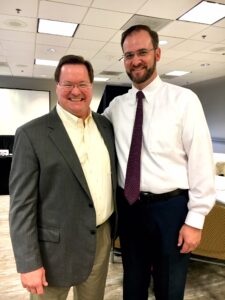
NASJE Facilitators
Tony Simones & Jeff Schrade“NACM wanted to offer an educational session to equip our NACM state court leaders with the knowledge and skills about how adults learn and how to apply that knowledge whether teaching the NACM CORE or leading the State Association,” observed Will Simmons, President-Elect of NACM. “We reached out to NASJE to design this session with the full confidence that it would be a great partnership.”
A four-hour session on “Leaders Teaching Leaders” was facilitated by Jeff Schrade, Education Services Division Director at the Arizona Supreme Court and Tony Simones, Director of Civic Education for The Missouri Bar. Twenty-one court managers who lead regional and state court management associations participated in the session, as well as seven experienced mentors from NACM leadership. To encourage and facilitate discussion, three participants and a mentor were placed at seven tables.
While Schrade and Simones presented information to the entire group on subjects ranging from the courts as learning organizations to adult learning principles and creating learning objectives, an even greater amount of time was given to the participants for analysis and discussion of these ideas in small groups at their tables. “Jeff and I knew it was essential that they go beyond just listening to information and actually engage each other nto build valuable skills,” Tony Simones stated. “We wanted them to return to their courts prepared to implement these concepts.”
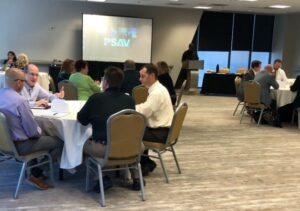 The day culminated with participants making presentations about material from the NACM Core that would create a foundation for interactions they will ultimately have with their own colleagues and staff. “Court leaders must teach – whether through formal classroom instruction, mentoring, or communicating with and persuading a wide variety of team members and other justice stakeholders,” commented Jeff Schrade.
The day culminated with participants making presentations about material from the NACM Core that would create a foundation for interactions they will ultimately have with their own colleagues and staff. “Court leaders must teach – whether through formal classroom instruction, mentoring, or communicating with and persuading a wide variety of team members and other justice stakeholders,” commented Jeff Schrade.Not only was the session designed to enhance the presentation and communication skills of regional court management association leaders, it was also intended to demonstrate to NACM leadership the viability of holding longer programs to explore topics in greater detail.
NACM President-Elect Will Simmons characterized the event as a success: “The NASJE facilitators, Tony Simones and Jeff Schrade, were outstanding and the “Leaders Teaching Leaders” session was designed perfectly to meet our needs. The participant feedback was phenomenal. We are very excited about our partnership with NASJE.”
-
Judge Peggy Hora Speaks at World Forum Against Drugs
NASJE member Judge Peggy Hora (Ret.), president and co-founder of the Justice Speakers Institute — an essential resource on national and international justice issues — was a featured speaker at the 6th World Forum Against Drugs on Monday, May 14, 2018, in Gothenburg, Sweden. She discussed the process of addiction recovery, when it is initiated by the criminal justice system, as well as benefits and outcomes of Drug Treatment Courts.
The biennial World Forum Against Drugs is presented under the patronage of H.M. Queen Silvia of Sweden. The entire two-day event is three conferences in one: a joint project of the World Federation Against Drugs, European Cities Against Drug, and the Swedish National Movement Against Drugs. It is hosted by the City of Gothenburg.
-
NASJE Member Assumes New Role for Missouri Bar
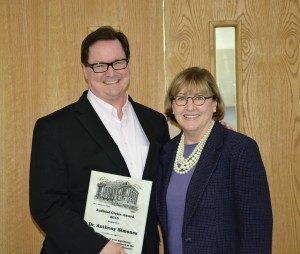
Dr. Anthony Simones and Judge Patricia Breckenridge Dr. Anthony Simones, a NASJE member since 2011, has resigned from his position as Manager of Judicial Education and Programming for the Missouri Office of State Courts Administrator and taken a position as Director of Citizenship Education for the Missouri Bar.
Dr. Simones worked extensively with the Supreme Court of Missouri’s Civic Education Committee in the six years he was with OSCA. This new position will allow him to focus exclusively on what he characterized as his “favorite part of the job.” “I had only been with OSCA for about a month when Judge Patricia Breckenridge of the Supreme Court, the Chair of the Civic Education Committee, asked me to be involved with her initiative,” Simones says. “What I didn’t realize at the time was that Judge Breckenridge was giving me the opportunity to lay the foundation for my dream job.”
In his new position, Dr. Simones will design, coordinate and deliver presentations and programming to Missourians about the necessity of a fair and impartial judiciary, the importance of the rule of law and the protection of civil liberties. He will also work with middle and high schools throughout Missouri to create and offer competitions designed to enhance students’ understanding of our constitutional system and to encourage their interest in, and involvement with, the system of justice.
“The Executive Director of the Missouri Bar, Sebrina Barrett, encouraged me to continue my involvement in the leadership of NASJE,” says Simones. A member of the NASJE Board of Directors for over three years, Dr. Simones is the current vice president of the organization.
“This new job will allow me to utilize my experience as a Professor of Constitutional Law, the work I have done with the Supreme Court of Missouri and what I have learned from NASJE,” Simones says. “In many ways, I have been preparing for this position for my entire professional career.”
-
Marty Sullivan Promoted in Arkansas
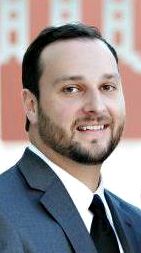
Marty Sullivan Marty Sullivan, who’s been interim director of the Administrative Office of the Courts, has been chosen the permanent director, Chief Justice Dan Kemp announced today.
Sullivan has worked in the office since 2003 and as education director since 2007. He’s a political science graduate of UA-Little Rock and holds master’s degrees from UA-Little Rock and Michigan State, the latter in judicial administration.
For more information, please read the Arkansas Times article.
-
Christine Christopherson Promoted in Nebraska
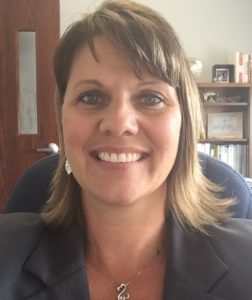
Christine Christopherson Christine Christopherson was promoted from Director of Court Staff Education to the Interim Director of Judicial Branch Education to encompass probation, court staff, and judges. Christopherson had been with the Supreme Court of Nebraska for about seven months.
With the departure of Shela Shanks, former State Bar Commission Director/Counsel on the Unauthorized Practice of Law, the Administrative Office of the Courts and Probation has taken the opportunity to refocus the leadership of the Judicial Branch Education Division and the Attorney Services Division which had a shared administrator. The separation will allow each to focus directly on the constituency served by their respective division. This change will become fully effective October 16, 2017.
Judicial Branch Education
Christine Christopherson will serve as Interim Director of Judicial Branch Education. The division will continue to provide education for judges, court staff, and probation staff as guided by the Judicial Branch Education Advisory Committee.Attorney Services Division
The Attorney Services Division, which oversees regulation of the legal profession and the provision of services by the Nebraska Supreme Court to all attorneys licensed in Nebraska, will continue under the leadership of Administrator Carole McMahon-Boies and will add Director of Admissions to her role. Attorney services will maintain the management of Mandatory Continuing Legal Education, attorney licensure, and bar examination.
The Counsel for Discipline, under the leadership of Mark Weber, will continue with the primary duty of investigation of disciplinary complaints against attorneys. The office will take on responsibilities and duties related to the Unauthorized Practice of Law formerly handled by Ms. Shanks. -
NASJE Members’ NACM Annual Conference Sessions Available Online
The sessions that Margaret Allen and Kelly Tait, both past presidents of NASJE, presented at the annual conference of the National Association for Court Management (NACM) and the International Association for Court Administration (IACA) in July 2017 were selected to be live-streamed and recorded.
Margaret Allen co-presented a session with the Center for Court Innovation’s Emily LaGratta on “The Evidence behind Effective Customer Service: Procedural Justice and Fair Treatment.” Kelly Tait taught a session on “Implicit Bias: How Our Amazing Brains Can Lead Us Astray.”
Recordings of their sessions as well as others from the conference are available at the NACM website or you can stream them below.
KELLY TAIT: Implicit Bias- How Our Amazing Brains Can Lead Us Astray
MARGARET ALLEN & EMILY LAGRATTA: The Evidence Behind Effective Customer Service- Procedural Justice and Fair Treatment